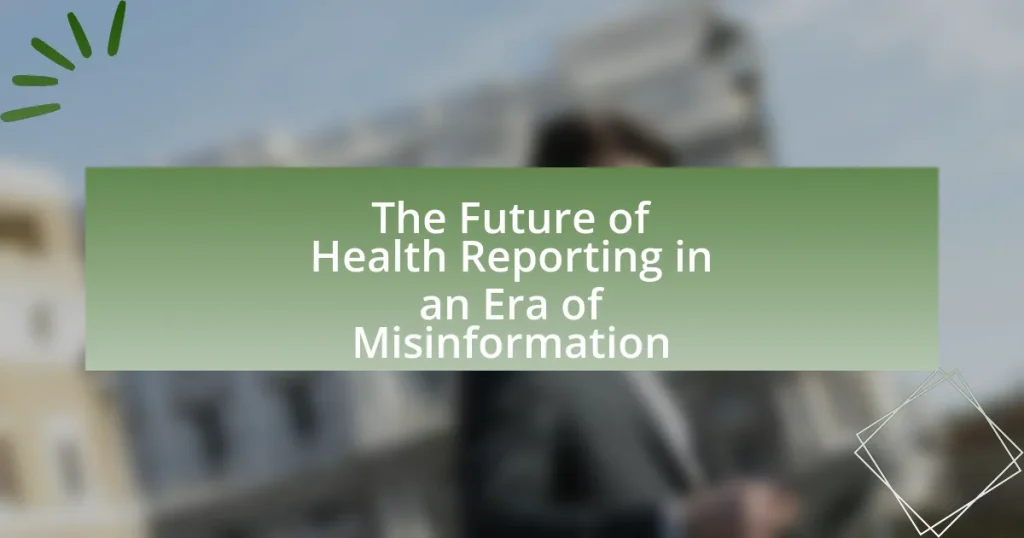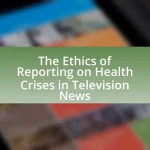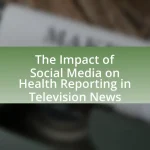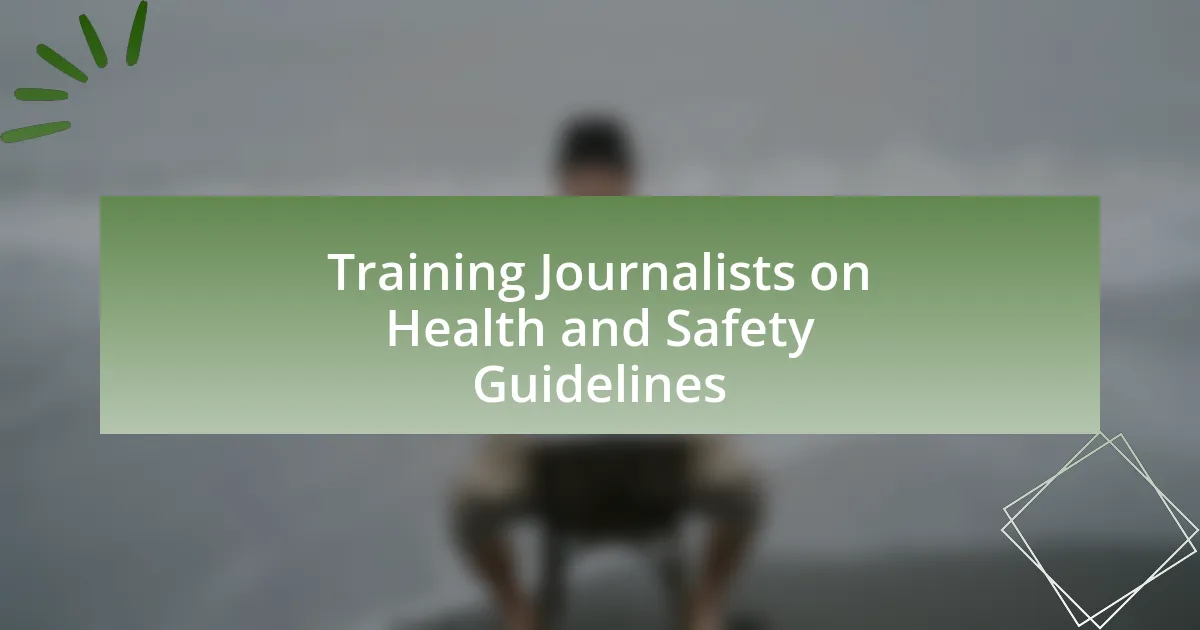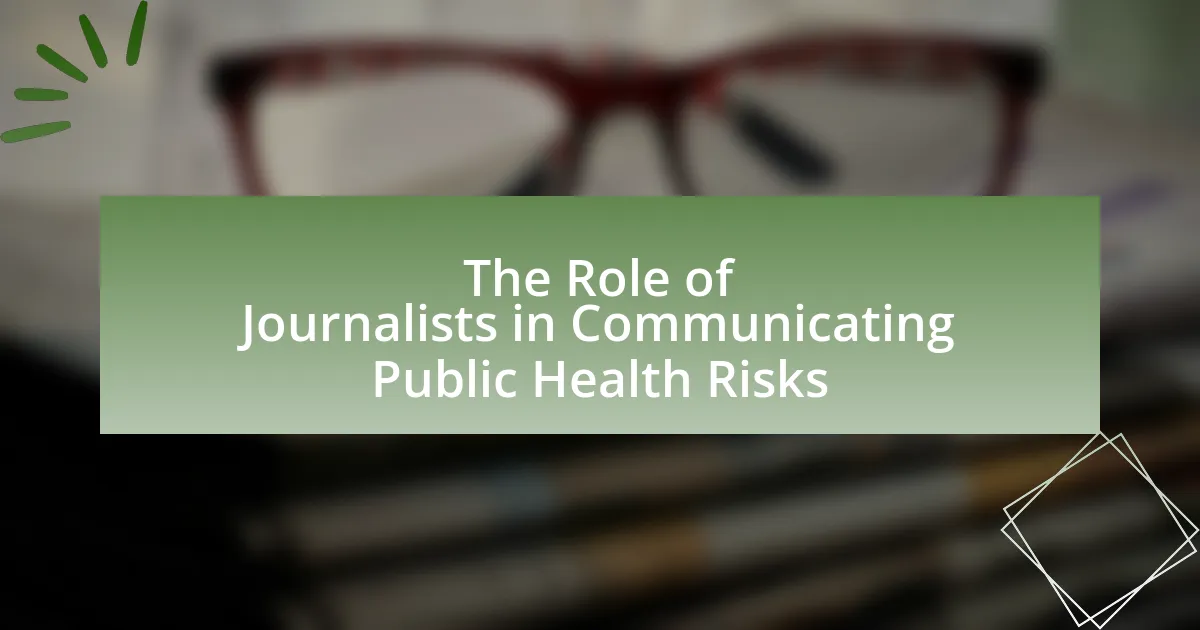The article focuses on the future of health reporting amid the challenges posed by misinformation. It highlights the increasing reliance on rigorous fact-checking and technology, such as artificial intelligence, to verify health information. The impact of misinformation on public perception, health behaviors, and policy decisions is examined, emphasizing the need for accurate reporting to foster informed decision-making. Additionally, the article discusses the role of social media, the skills required for health reporters, and innovative strategies to enhance reporting accuracy, ultimately advocating for collaboration among health organizations, journalists, and fact-checkers to combat misinformation effectively.
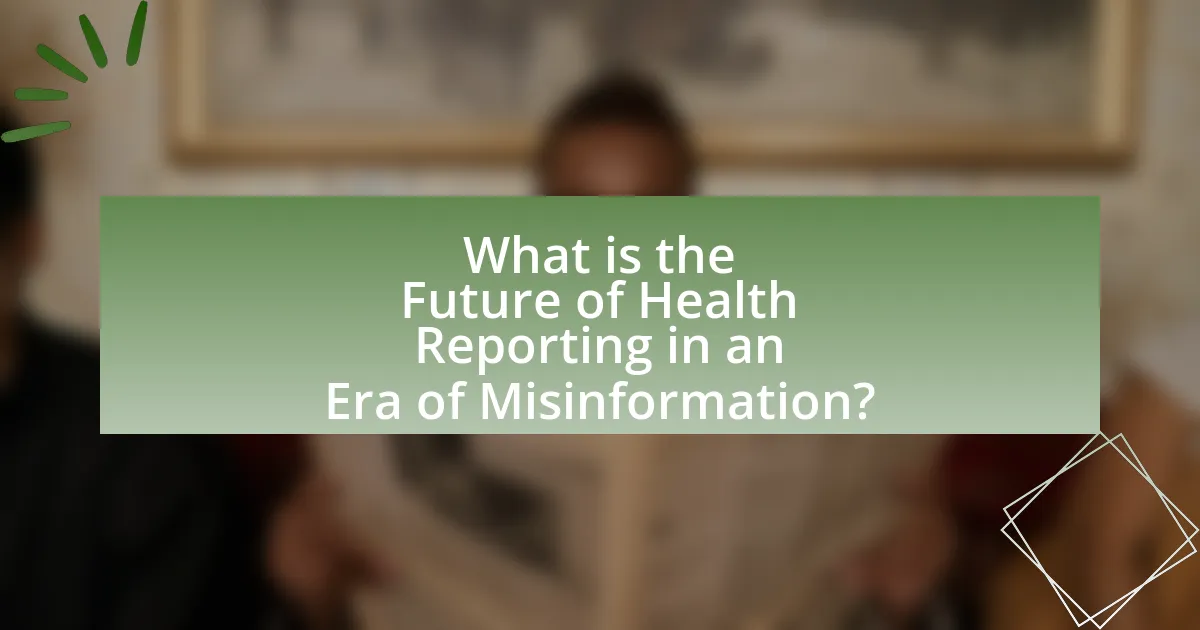
What is the Future of Health Reporting in an Era of Misinformation?
The future of health reporting in an era of misinformation will increasingly rely on rigorous fact-checking and the use of technology to verify information. As misinformation spreads rapidly through social media and other platforms, health reporters will need to adopt advanced tools, such as artificial intelligence, to assess the credibility of sources and data. For instance, a study by the Pew Research Center in 2021 found that 64% of Americans believe misinformation has caused confusion about health issues, highlighting the urgent need for accurate reporting. Furthermore, collaboration between health organizations, journalists, and fact-checking entities will be essential to ensure that the public receives reliable health information. This collaborative approach can help counteract the effects of misinformation and promote informed decision-making among the public.
How has misinformation impacted health reporting today?
Misinformation has significantly undermined the credibility of health reporting today. The prevalence of false information, particularly during health crises like the COVID-19 pandemic, has led to public confusion and mistrust in legitimate health sources. For instance, a study published in the journal “Health Affairs” found that misinformation about COVID-19 was associated with increased vaccine hesitancy, demonstrating a direct impact on public health outcomes. Furthermore, health reporters often face challenges in verifying information, as they must navigate a landscape filled with misleading claims, which can result in the dissemination of inaccurate health information. This environment complicates the role of journalists, who are tasked with providing accurate and timely health news while combating the spread of false narratives.
What are the common sources of misinformation in health reporting?
Common sources of misinformation in health reporting include social media, poorly conducted studies, and sensationalist journalism. Social media platforms often amplify unverified claims, leading to widespread dissemination of false information. Poorly conducted studies, such as those lacking rigorous peer review, can mislead the public and health professionals alike. Sensationalist journalism prioritizes attention-grabbing headlines over accuracy, which can distort the facts surrounding health issues. These factors contribute significantly to the prevalence of misinformation in health reporting, undermining public trust and informed decision-making.
How does misinformation affect public perception of health issues?
Misinformation significantly distorts public perception of health issues by creating confusion and fostering distrust in credible sources. For instance, during the COVID-19 pandemic, studies indicated that misinformation led to increased vaccine hesitancy, with a survey revealing that 36% of respondents believed false claims about vaccine safety. This distortion can result in individuals making uninformed health decisions, ultimately impacting public health outcomes. Furthermore, the spread of inaccurate information can undermine public health campaigns, as seen when misleading narratives about mask efficacy contributed to lower compliance rates, thereby exacerbating the spread of the virus.
Why is accurate health reporting crucial in today’s society?
Accurate health reporting is crucial in today’s society because it directly influences public health decisions and behaviors. Reliable information helps individuals make informed choices regarding their health, such as vaccination, disease prevention, and treatment options. For instance, during the COVID-19 pandemic, accurate reporting on transmission rates and vaccine efficacy was essential in guiding public compliance with health guidelines, ultimately affecting infection rates and mortality. Misinformation can lead to harmful behaviors, such as vaccine hesitancy, which the World Health Organization identified as a significant threat to global health. Therefore, precise health reporting is vital for fostering a well-informed public and promoting overall community health.
What role does health reporting play in public health outcomes?
Health reporting plays a crucial role in shaping public health outcomes by providing accurate information that influences health behaviors and policy decisions. Effective health reporting ensures that the public receives timely and reliable data about health risks, preventive measures, and treatment options, which can lead to improved health literacy and informed decision-making. For instance, during the COVID-19 pandemic, accurate health reporting was essential in disseminating information about transmission rates, vaccination benefits, and safety protocols, ultimately impacting public compliance and health outcomes. Studies have shown that communities with robust health reporting systems experience better health outcomes, as they are more likely to engage in preventive health behaviors and utilize healthcare services effectively.
How can accurate health reporting influence policy decisions?
Accurate health reporting can significantly influence policy decisions by providing reliable data that informs lawmakers about public health needs and trends. When health reports are based on sound research and factual information, they enable policymakers to allocate resources effectively, prioritize health initiatives, and implement evidence-based regulations. For instance, during the COVID-19 pandemic, accurate reporting on infection rates and vaccine efficacy directly shaped government responses, including lockdown measures and vaccination campaigns, demonstrating how data-driven decisions can lead to improved health outcomes.
What challenges do health reporters face in combating misinformation?
Health reporters face significant challenges in combating misinformation, primarily due to the rapid spread of false information through social media and the internet. The immediacy of digital platforms allows misleading health claims to reach large audiences quickly, often outpacing accurate reporting. Additionally, health reporters must navigate complex scientific data and communicate it effectively to the public, which can be difficult when misinformation simplifies or distorts these facts. A study by the Pew Research Center found that 64% of Americans believe that misinformation has caused confusion about health issues, highlighting the pervasive impact of false information on public understanding. Furthermore, health reporters often encounter pressure from various stakeholders, including government entities and health organizations, which may influence the framing of health narratives, complicating their efforts to provide unbiased and accurate information.
How do social media platforms contribute to the spread of misinformation?
Social media platforms contribute to the spread of misinformation by enabling rapid dissemination of unverified content to vast audiences. The algorithms used by these platforms often prioritize engagement over accuracy, leading to sensational or misleading information being shared more widely than factual reporting. For instance, a study by the Massachusetts Institute of Technology found that false news stories are 70% more likely to be retweeted than true stories, highlighting the platforms’ role in amplifying misinformation. Additionally, the lack of stringent fact-checking mechanisms allows misleading claims to proliferate unchecked, further complicating the public’s ability to discern credible information in health reporting.
What skills are necessary for health reporters to effectively address misinformation?
Health reporters need critical thinking, research proficiency, and effective communication skills to effectively address misinformation. Critical thinking enables reporters to analyze and evaluate the credibility of sources and claims, ensuring they distinguish between accurate information and falsehoods. Research proficiency allows them to gather data from reliable scientific studies and expert opinions, which is essential for fact-checking and providing context. Effective communication skills are necessary for clearly conveying complex health information to the public, making it accessible and understandable. These skills collectively empower health reporters to combat misinformation and promote informed public discourse.
How can health reporting evolve to counter misinformation?
Health reporting can evolve to counter misinformation by adopting rigorous fact-checking protocols and collaborating with experts in the field. Implementing standardized guidelines for verifying sources and claims can enhance the credibility of health information. For instance, the Trust Project has established criteria that news organizations can follow to improve transparency and accountability in reporting. Additionally, utilizing data analytics to track misinformation trends allows health reporters to proactively address false narratives. Research from the Pew Research Center indicates that 64% of Americans believe that misinformation is a major problem, highlighting the need for health reporting to adapt and prioritize accuracy.
What innovative strategies can be employed in health reporting?
Innovative strategies in health reporting include utilizing data visualization, engaging multimedia storytelling, and implementing fact-checking mechanisms. Data visualization enhances comprehension of complex health data, as evidenced by studies showing that visual representations can improve information retention by up to 65%. Engaging multimedia storytelling, which combines text, audio, and video, captures audience attention and increases engagement, leading to a 50% higher likelihood of sharing health content. Fact-checking mechanisms, such as partnerships with independent verification organizations, ensure accuracy and build trust, with research indicating that accurate reporting can reduce misinformation spread by 70%. These strategies collectively enhance the effectiveness and reliability of health reporting in an era characterized by misinformation.
How can technology enhance the accuracy of health reporting?
Technology can enhance the accuracy of health reporting by utilizing data analytics, artificial intelligence, and real-time information sharing. Data analytics allows for the aggregation and analysis of vast amounts of health data, enabling reporters to identify trends and verify facts more effectively. For instance, AI algorithms can process medical literature and clinical trial results to provide accurate summaries and insights, reducing the risk of misinformation. Additionally, real-time information sharing through digital platforms ensures that health reporters have access to the latest data and updates, which is crucial during health crises. According to a study published in the Journal of Medical Internet Research, the use of AI in health reporting has been shown to improve the accuracy of information by up to 30%, demonstrating the significant impact of technology on health communication.
What role do fact-checking organizations play in health reporting?
Fact-checking organizations play a crucial role in health reporting by verifying the accuracy of health-related information disseminated to the public. These organizations assess claims made by media outlets, public figures, and health authorities, ensuring that the information is based on credible scientific evidence. For instance, during the COVID-19 pandemic, fact-checking organizations like FactCheck.org and Snopes actively debunked misinformation regarding vaccines and treatments, helping to guide public understanding and decision-making. Their efforts contribute to a more informed public, reduce the spread of false information, and enhance the overall quality of health reporting.
What best practices should health reporters adopt in the face of misinformation?
Health reporters should adopt rigorous fact-checking, source verification, and clear communication as best practices in the face of misinformation. Rigorous fact-checking involves cross-referencing information with credible sources, such as peer-reviewed studies or official health organizations like the World Health Organization. Source verification requires reporters to assess the credibility of their sources, ensuring they are reputable and have expertise in the relevant field. Clear communication entails presenting information in an understandable manner, avoiding jargon, and providing context to help the audience grasp complex health issues. These practices are essential to maintain journalistic integrity and combat the spread of false information effectively.
How can health reporters build trust with their audience?
Health reporters can build trust with their audience by ensuring accuracy and transparency in their reporting. Accurate reporting involves fact-checking information and citing credible sources, which helps to establish reliability. For instance, a study published in the Journal of Health Communication found that audiences are more likely to trust health information when it is backed by peer-reviewed research and expert opinions. Additionally, transparency about the reporting process, including disclosing potential conflicts of interest and the methodology used in gathering information, fosters credibility. By consistently applying these practices, health reporters can effectively cultivate trust with their audience.
What resources are available for health reporters to verify information?
Health reporters can utilize several resources to verify information, including reputable medical journals, government health agencies, and fact-checking organizations. Reputable medical journals, such as The New England Journal of Medicine and The Lancet, provide peer-reviewed studies that offer reliable data. Government health agencies like the Centers for Disease Control and Prevention (CDC) and the World Health Organization (WHO) publish guidelines and statistics that are authoritative. Additionally, fact-checking organizations such as Snopes and PolitiFact can help reporters assess the accuracy of health-related claims. These resources collectively enhance the credibility of health reporting by ensuring that information is accurate and evidence-based.
What are the implications of improved health reporting for the future?
Improved health reporting will lead to enhanced public health outcomes by providing accurate, timely, and accessible information. This accuracy fosters informed decision-making among individuals and communities, ultimately resulting in better health behaviors and outcomes. For instance, studies have shown that clear health communication can increase vaccination rates and adherence to medical advice, as evidenced by the CDC’s findings during the COVID-19 pandemic, where effective messaging significantly influenced public compliance with health guidelines. Furthermore, improved health reporting can combat misinformation, as reliable sources can counteract false narratives, thereby strengthening public trust in health authorities and promoting a more health-literate society.
How can individuals contribute to better health reporting?
Individuals can contribute to better health reporting by actively verifying information before sharing it. This involves cross-referencing health claims with reputable sources such as peer-reviewed journals, government health websites, or established medical organizations. For instance, a study published in the Journal of Medical Internet Research found that misinformation can spread rapidly on social media, but individuals who fact-check information can significantly reduce its dissemination. By promoting accurate information and discouraging the spread of false claims, individuals play a crucial role in enhancing the quality of health reporting.
What actions can the public take to support accurate health information dissemination?
The public can support accurate health information dissemination by critically evaluating sources before sharing information. This involves checking the credibility of the source, such as verifying if it is a recognized health organization or a peer-reviewed journal. Research indicates that misinformation can spread rapidly, with a study published in the American Journal of Public Health showing that false health information can reach millions within hours. By prioritizing reliable sources, individuals can help reduce the spread of inaccuracies and promote informed decision-making within their communities.
